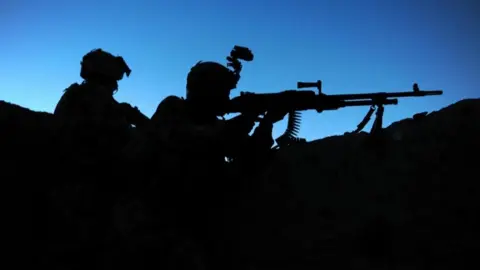An investigation by the British Army has revealed that troops stationed at the British Army Training Unit Kenya (BATUK) are continuing to engage with sex workers despite a ban against such practices. The inquiry found instances of soldiers using sex workers at what is described as a “low or moderate” level, indicating that the issue remains prevalent at the base. The investigation covered over two years and focused on conduct at BATUK dating back to July 2022. This probe was commissioned in October 2024 following allegations highlighted by an ITV report that soldiers were paying local women for sex.
The situation surrounding BATUK has long been contentious, particularly following the tragic death of Agnes Wanjiru, a local woman allegedly murdered by a British soldier in 2012. Following this incident, multiple allegations and concerns have been raised regarding the behavior of British troops in the area. This was compounded by the Ministry of Defence’s decision in 2022 to prohibit its forces from engaging sex workers while stationed abroad, as part of efforts to curb issues of sexual exploitation and abuse within the military.
The findings from the inquiry were emphasized by UK Chief of Defence Staff General Sir Roly Walker, who expressed commitment to tackling sexual exploitation within the army. He stated that the report acknowledged the persistence of “transactional sex” among soldiers stationed in Kenya, a situation he insisted should not be tolerated. Walker underscored the imperative of safeguarding vulnerable individuals from exploitation and confirmed that there is “no place” for such behavior in the British Army, emphasizing it contradicts the core values expected of a British soldier.
The inquiry was executed by a panel comprising two active-duty officers, a civil servant, and an independent advisor, which investigated soldiers’ behavior while assessing the military’s controls designed to prevent violations of its regulations prohibiting the use of sex workers. Notably, the inquiry identified 35 suspected instances of soldiers paying for sex after the ban on this activity was implemented. Out of the 7,666 British soldiers who served at the base during this review period, a majority of cases were unsubstantiated.
Furthermore, despite comprehensive training provided by the Army and established protocol to deter such behavior, the report noted that “transactional sexual activity” by UK personnel was still occurring. It stated that the level of transgressions was low to moderate but should be treated with caution, indicating a notable gap in the effectiveness of the measures put in place to eradicate the issue.
To address these challenges, recommended actions will involve streamlining procedures for dismissing soldiers discovered to have engaged with sex workers, alongside enhanced training initiatives to instill a greater understanding of appropriate conduct among personnel. Moreover, the military has introduced oversight mechanisms such as “sharkwatch” patrols, conducted by senior officers overseeing the behavior of junior personnel on nights out.
This report emerges in the wake of continuing scrutiny faced by BATUK, particularly following another investigative report that drew parallels between soldiers’ alleged involvement in Wanjiru’s death and current issues surrounding misconduct. In parallel, Kenyan members of parliament have initiated their own inquiries into reported mistreatment of local civilians, with claims of injuries inflicted through soldiers’ actions and instances of soldiers fathering children with local women without taking responsibility upon returning to the UK.
In summary, the investigated misconduct at the British Army’s training base in Kenya highlights an urgent need for reforms within the military’s approach to sexual exploitation. The findings unveil systemic challenges in adhering to ethical conduct, stressing the reality that, while guidelines and training have been instituted, substantial violations of these directives remain an issue that calls for immediate and firm action from military leadership.











